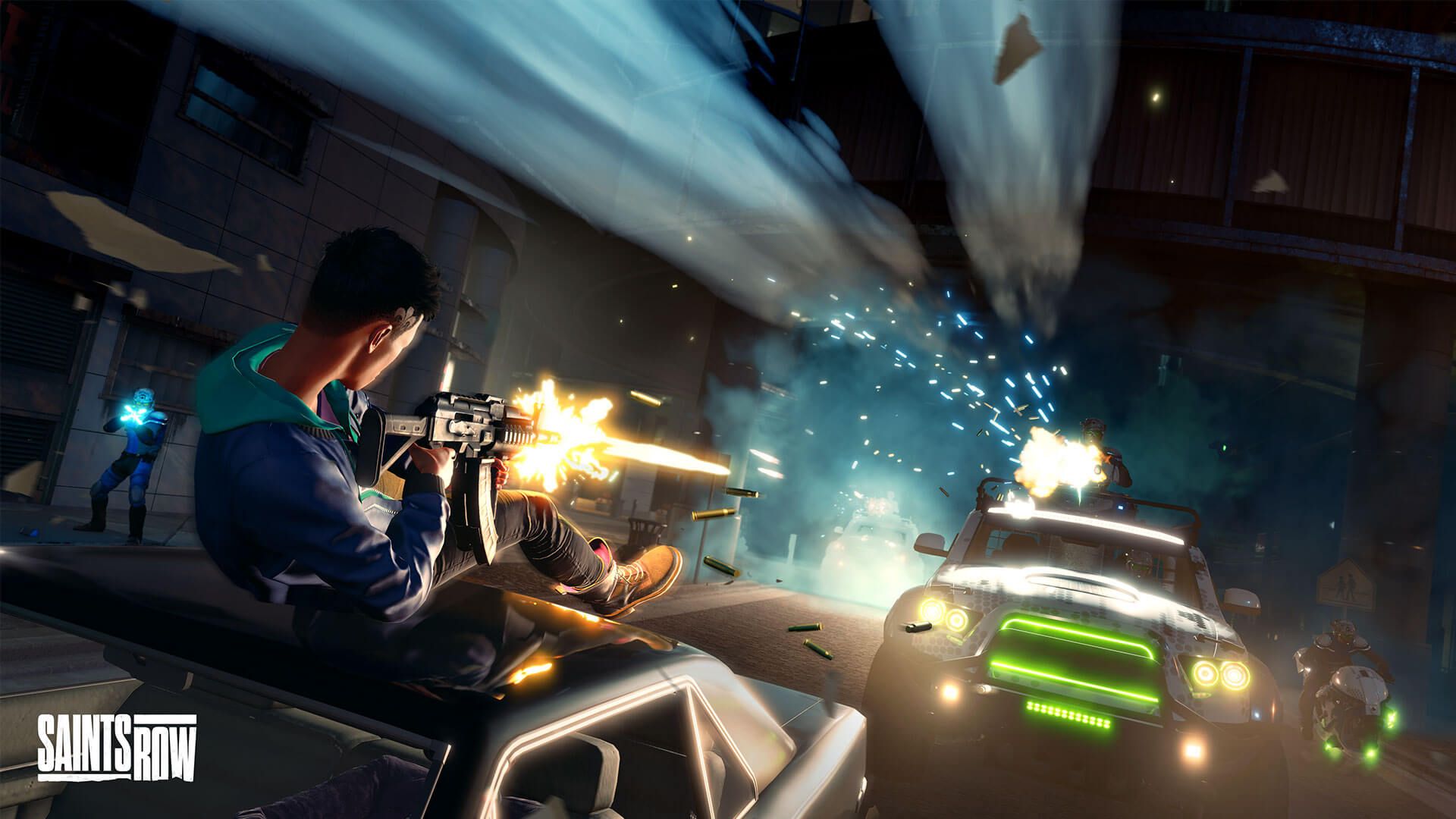Saints Row isn’t very good. I always had my hesitations with the reboot, unsure about its new approach to story and characters and a reliance on gameplay systems that already felt outdated ten years ago. Volition was clearly harkening back to a different era, placing all its bets on a nostalgia goldmine that it needed existing fans to latch onto. We tried to, and I don’t think the studio ever once undersold or misrepresented the game it was making, but goodness me the result is so mediocre it stings. On almost every account, it’s a big ol’ miss.
Volition seeks to recapture the playful magic of past entries, but doesn’t seem to possess a single cohesive direction. It wants to lean into the wackiness and irreverent humour of Saints Row The Third, while also drawing from the more serious gang warfare of 1 & 2, yet it also hopes to establish its own identity as a millennial success story of young people rising up from the corrupt structures of an establishment and make their own mark on the world. This is a game that doesn’t know what it wants to be, and thus it ends up feeling meaningless.
The reboot opens with a whimper. A sedated dance party at The Saints HQ immediately flashes back to several months in the past, with our new vision of The Boss working for a private military company intent on murdering rival gangs. It is framed as a tiresome grind as our protagonist is thrown to the wolves on her first day with no training to speak of. Much like the real world, millennials must fend for themselves and will seldom receive assistance from older generations hoping to maintain their position atop the food chain. On the surface this could have been the foundation for a biting political commentary, but it comes down to a few forgettable jokes about making rent and health insurance. There is no bite, and no wider understanding of the societal issues Saints Row is so confident in saying it represents.
It doesn’t get any better either, instead it doubles down on a depiction of youth culture that only serves to highlight how out of touch it really is. The Saints share an apartment in the game’s opening hours, having a roommate code and always watching each other’s back despite working for different gangs across the city of Santo Ileso. The way these people who have all been dealt a bad hand stick together in the face of adversity is cute and honest, but the myriad issues they talk about tackling are all surface level and are never reinforced by the overarching narrative. We are working for the man, but aside from making weak jokes there is never an attempt by the game to analyse this power dynamic and do something about it, or go further than making irritating jokes about capitalism while simultaneously leaning into some of the very worst habits such things have come to perpetuate. The opportunities more than present themselves in the early hours too, which makes it all the more frustrating to witness.
Saints Row is spineless, and suffers an untold amount because it wants so badly to be a young, hip adaptation of this series for a new generation, while also blatantly failing to understand the audience it seeks to depict in the first place. The majority of characters – most of which are sadly forgettable – occupy expectant archetypes and don’t sport the backstories we’ve come to expect from the series. I know the likes of Johnny Gat, Pierce, and Shawndi never stood for anything either, but at least as characters they swung for the fences and nailed everything they set out to achieve. Here I’m already struggling to care, with the writing only serving to betray the detachment of Volition from the world we live in. Our main cast all working for rival gangs does eventually become a sticking point, with them realising that forming their own gang instead of providing their talents for the success of others is the better path forward, but this doesn't really result in any particular instance that sticks in the memory. It's hollow, and once again, just a bit meaningless.
Given that it leaves behind much of the series’ trademark zaniness for a more grounded approach to open world crime shenanigans, Saints Row arguably needed a stronger story and more memorable characters to carry it forward. There are no slimy purple dildo baseball bats to be found, and even side activities lean into the gig economy in ways that fall short of past iterations. Everywhere you look it feels like this reboot is determined to hold itself back, and at all times it never knows what it wants to be. We are struggling millennials failing to make rent and earn a living, while behind my apartment is a random dumpster hiding $5,000. Make it make sense, otherwise the entire thing ends up falling apart.
I think it all comes down to a Pride Flag in the crew’s apartment. There are no queer characters on the cast, nor is LGBTQ+ representation ever explored much beyond the person we create in the game’s avatar creator. It is a hollow sign of support thrown in to acknowledge a minority group that Saints Row otherwise has no interest in speaking for. Young people in the current landscape are fruitier than ever, and must fight for their rights in a world that feels determined to take them away. That form of social justice, albeit on a far more explosive scale, could have been a huge thing for Saints Row to explore, or practically any issue that mirrors the real world and takes older generations to task for the economy, climate change, bigotry, or literally anything instead of poorly written jokes that think they're vibing with the cool kids.
The same goes for millennials and zoomers as a whole. Making ends meet and rising through the ranks to become masters of the criminal underworld eager to upend the status quo isn’t a societal message that this game is wants to cement, but merely a framing device to introduce a fleeting property to a new generation under the guise of being hip and cool.
Saints Row has always been a flag bearer for counter culture, a rebellious outlaw when pitted against the likes of Grand Theft Auto. It wanted to be different, to stand for something else far away from normalcy. But with that zany identity left behind you’d hope it would be replaced by something equally compelling, or a new outlook that hopes to reflect the generations its droll characters happen to occupy.
The reboot delivers on none of that and snuffles out its own future as a consequence. We don’t care for these new characters or have the capacity to sympathise with whatever they're fighting for, and that’s all because they’re written to be lightweight facsimiles of young people in the real world who are being put through the ringer each and every day. We can’t exactly rise up and change things for the better on our own, but Saints Row could have carried that torch and done it for us.
It didn’t, and I have no idea where it goes from here.
Source: Read Full Article


